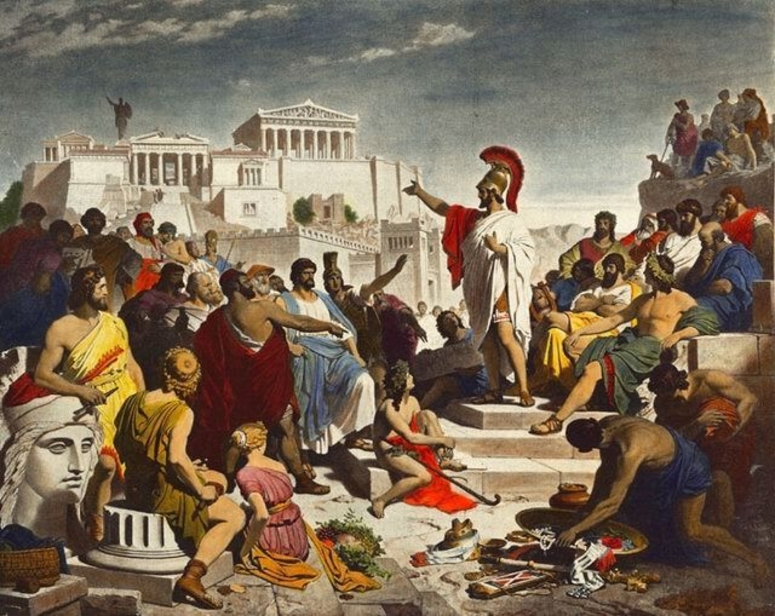Thucydides Roundtable, Book IV: General Demosthenes
Thursday, November 17th, 2016[by A. E. Clark]
I cannot be the only reader to have been fascinated by the career of Demosthenes, the Athenian commander.
In outline:
(3.94-98) His attack on Aetolia, undertaken as the beginning of an ambitious campaign (projected, apparently only by Demosthenes, to pass through Boeotia), ends in disaster. The narrative supplies enough details for us to ponder the flaws in the general’s decision-making.
(3.102) His move to save Naupactus with troops he wheedles from allies whom he previously snubbed is all the more impressive because at this point Demosthenes has few resources — his generalship may have ended, and he is in such disfavor that it would be personally dangerous for him to return to Athens.
(3.105) Allies ask him to lead them in the West when the Peloponnesian army that he stymied at Naupactus keeps marching.
(3.107) An ambush on the battlefield brings him victory at Olpae.
(3.109) He craftily separates the Peloponnesians from their local allies.
(3.112) He wins a massive victory at Idomene by positioning his troops stealthily during the night and launching a pre-dawn surprise attack in which the enemy’s sentries are confused by Demosthenes’ use of allied troops whose dialect resembles the enemy’s.
(4.2) Demosthenes finagles himself an unofficial berth on a fleet rounding the Peloponnesus to relieve Corcyra.
(4.3-5) He has a plan: make an unscheduled stop and create an outpost at Pylos, in the Messenian country where the Spartans fear revolt. The generals in charge of the fleet laugh at him. Grossly insubordinate, he appeals to the soldiers and the junior officers. No one will listen. Then a storm drives the fleet into shelter at Pylos. They still won’t listen to him. But as the weather keeps them trapped in harbor, the soldiers get bored and decide to build Demosthenes his outpost. (Did it really happen like that? One wonders.) But he has neglected to bring any tools, so they must pile rocks to create walls in the most primitive manner. The weather improves; the fleet sails on, leaving a very small force with Demosthenes in his vulnerable outpost.
(4.6) The Spartans are so alarmed by this tiny threat to their rear that they recall the army that has been laying waste the country around Athens.
(4.8) Then they come in ships to wipe him out.
(4.9-12) Having figured out where they will attack, he repels them from the beach in an epic action where one Brasidas, who will go on to do more harm to Athens than perhaps any other Spartan, is almost killed.
(4.13-14) The Athenian navy arrives in the nick of time. The Athenians discover they have trapped hundreds of the Spartan elite on a desert island next to Pylos: a most valuable bargaining chip.
(4.17-20) Sparta offers peace.
(4.21-22) Overreaching as they often do in this Greek tragedy, the Athenians (instigated by the detestable Cleon) spurn the offer.
(4.26-38) The blockade of the island proves long and difficult. The Athenians blame Cleon and, calling his bluff, send him to sort it out in the expectation that he will humiliate himself. Thanks to Demosthenes, who is mindful (Thucydides explicitly says) not to repeat a mistake he made in Aetolia, the Spartiates are defeated by Demosthenes’ use of stand-off missiles and a surprise attack from the rear. They surrender.
(4.41) Again, the Athenians have a chance to end the war on favorable terms. Thucydides says, “The Athenians, however, kept grasping at more, and dismissed envoy after envoy…”
These events, engagingly narrated by our historian, make a strongly favorable impression. It seems that Demosthenes learned from an early failure and, with a penchant for surprise attacks that was unusual in the warfare of his time, achieved significant victories. I’d say Demosthenes won the war twice — once at Pylos and once at Sphacteria — but the Athenians threw the victory away each time. There is more to the story, however. Now for Part II:
(4.66-73) Demosthenes and Hippocrates undertake a complex scheme to seize control of Megara with the help of traitors within the city. Again he carries out one of his signature night-time ambushes. But the Athenians are only partly successful, and soon find themselves confronted by the decisive and resolute Brasidas. They give up on Megara without a battle.
(4.89-100) A Boeotian campaign is entrusted to the same two generals. It fails disastrously, with Hippocrates getting killed and his division bearing the brunt of the losses. Thucydides is unclear about the details, but it seems that Demosthenes may have made an error of timing, as a result of which two separate surprise attacks that needed to be synchronized . . . weren’t. It also seems that the enemy caught wind of their plans.
(4.101) Demosthenes undertakes a raid against a coastal city west of Corinth. He fails to take the adversary by surprise and his troops are routed.
(5.80) Demosthenes is sent to evacuate a fort among allies of uncertain loyalty; he employs a ruse to accomplish this safely.
But alas, there is more. In Part III, Demosthenes loses the Peloponnesian War:
(7.42) Demosthenes arrives in Syracuse to salvage the faltering Sicilian expedition.
(7.43-44) He hastens to mount a large-scale night-time surprise attack on Epipolae. Historians judge this to be a first, indeed wholly original: a large-scale nyktomachia, a night battle. It miscarries due to poor intelligence, poor communication, and the inherent riskiness of such an action in the absence of radios or night-vision goggles. Athenian losses are in the thousands, and morale is shattered.
(7.47-49) Having gambled and lost, Demosthenes votes to go home or at least move camp, but Nicias, the general on the scene whom he had criticized, refuses and prevails in council.
(7.72) After a devastating naval defeat, Demosthenes recognizes that the Athenians’ best way out is still by sea, but the demoralized soldiers won’t listen to him. They choose, fatally, to make their way overland to another part of the island.
(7.81) Marching “somewhat slowly and in disorder,” his division is surrounded by the Syracusans. According to Plutarch, Demosthenes attempts suicide. Soon the rest of the Athenian army will also be captured.
(7.86) In captivity, Demosthenes is “butchered.”
As I struggled to draw conclusions from this extraordinary tale, I realized that I needed help, and I wondered if anyone had written a book about Demosthenes. The New York Public Library was kind enough to fetch from its offsite storage a 1993 monograph [1] by Joseph Roisman. It is a work of marvelous scholarship, free from pedantry and full of carefully-reasoned judgments. Roisman notes that Demosthenes seems to have been always attracted to surprise tactics without realizing how heavily such tactics depend on good intelligence.
Moreover, the surprise attack works best on a small scale. On a large scale, the friction of big organizations is wont to spoil the surprise or to impede the necessary coordination, and operational security is also harder to maintain when large numbers of people are involved. This was especially true in the ancient world with its limited technologies of communication.
At Olpae and Idomene, Roisman argues, Demosthenes received excellent intelligence from his local allies, and his goals were realistic. I would note also that he showed prudence in letting the Peloponnesians get away: he was limiting himself to defeating the Ambraciots. At Sphacteria, Roisman says, “He was successful because he had adequate intelligence, time to plan, and some luck; and he used surprise tactics on a careful and limited basis.”
In the Aetolian campaign, by contrast, Demosthenes was led on by an ambitious goal (a march through hostile Boeotia) for which his resources were inadequate. He had only a superficial plan, and when some of its key conditions were violated, he kept going with it anyway, convinced that he could take the enemy by surprise and that this would ensure victory. Worst of all, he had no good local intelligence. Where other scholars see the Aetolian defeat as “his education in the art of warfare,” Roisman sees it as “a presage of future disasters.”
Roisman notes in the general “an inclination to embrace ambitious goals combined with a willingness to give up when the campaigns failed to produce their projected results immediately.” You can see this in the backing down from Megara as well as his eagerness to stake everything on a single roll of the dice at Epipolae: a tendency, in Roisman’s words, “to approach military problems in terms of immediate and decisive success or failure.” I will not spell out the obvious lessons; Parts II and III of Demosthenes’ career do that quite well.
The nuanced intuition in Roisman’s analysis makes me wonder whether this alumnus of Tel Aviv University may have gained a certain Fingerspitzengefühl from a stint in the IDF. He has done other work on ancient military history, with a particular focus on Alexander the Great. I look forward to exploring that oeuvre; in the meanwhile, if you can get your hands on it, I recommend his Demosthenes monograph very highly.
[1] Roisman, Joseph. The General Demosthenes and His Use of Military Surprise. HISTORIA Einzelschriften 78, Franz Steiner Verlag, Stuttgart 1993




